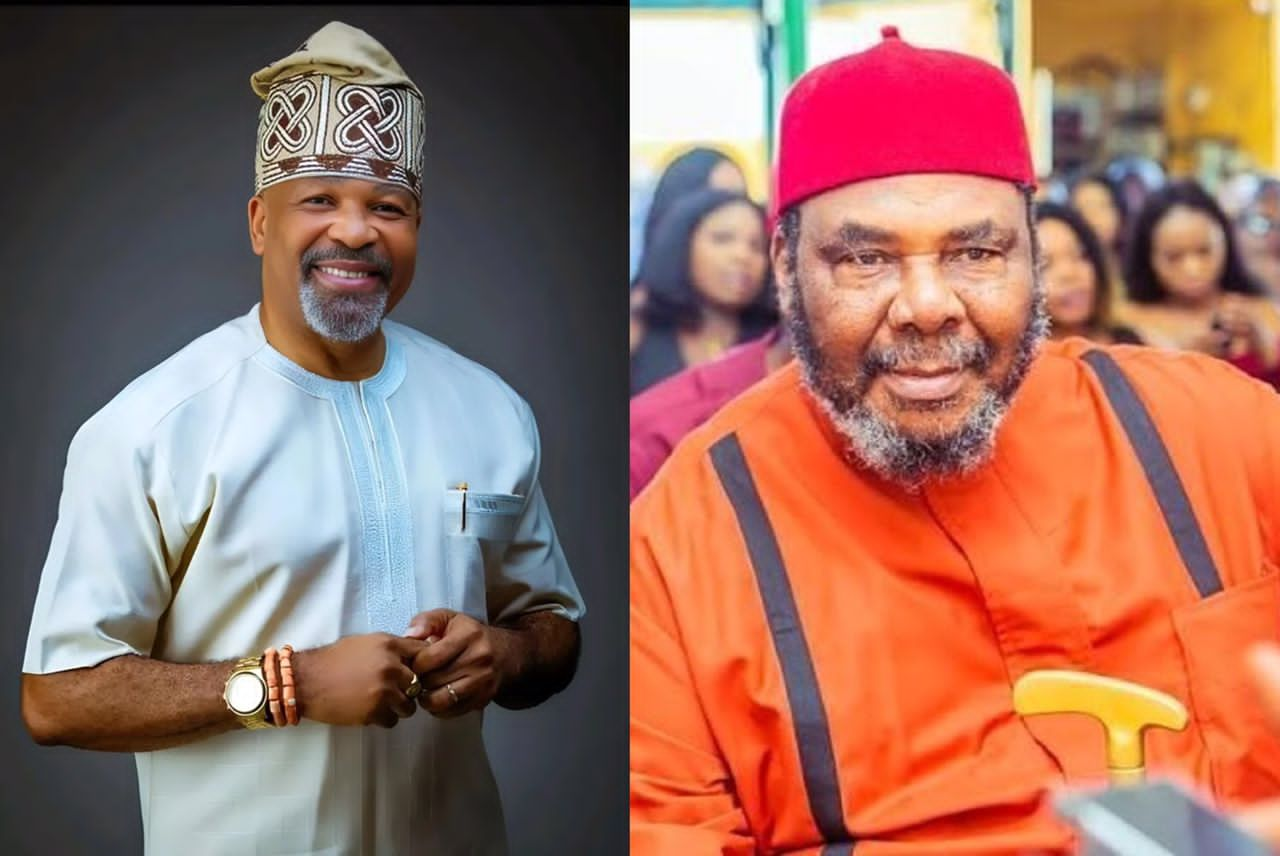
"I’m Senior to Pete Edochie in Nollywood!" – Yemi Solade Sparks Debate Over Who Truly Paved the Way in Nigerian Film Industry

Veteran actor Yemi Solade has sparked a storm of reactions online following his bold claim that, although Pete Edochie may be older in age, he — Yemi Solade — is in fact his senior in Nollywood. The surprising statement has stirred widespread debate among fans and colleagues in the Nigerian entertainment industry, reigniting discussions about the true pioneers of Nollywood and the unspoken hierarchies that exist among its stars.
In a recent interview that has since gone viral, Yemi Solade confidently asserted, “I am senior to Pete Edochie when it comes to acting in Nollywood. I started long before him. He’s older than me by age, yes, but when we talk of Nollywood, I entered before him. That’s the fact.” The statement, delivered with a calm but assured tone, was met with gasps by some and agreement by others who have followed the evolution of Nigeria’s film industry from its early roots in stage plays and television dramas to the global force it is today.
Yemi Solade, known for his deep baritone and commanding presence on screen, is a well-respected figure in Nigerian cinema. His journey into acting began decades ago in theatre and television, long before the term “Nollywood” was coined. With appearances in classic productions and a portfolio that spans across Yoruba, English, and indigenous-language films, Solade has remained a consistent force in the ever-changing landscape of Nigerian entertainment. His claim, however, has brought him back into the limelight — not just for his achievements, but for challenging what many have long believed to be unshakable truths.
Pete Edochie, on the other hand, is often referred to as a “godfather” of Nollywood. Best known for his legendary role as Okonkwo in the television adaptation of Chinua Achebe’s “Things Fall Apart,” Edochie’s baritone voice and charismatic screen presence have made him a household name across Africa. His fans and followers regard him not just as an actor, but as a cultural icon whose face and voice are associated with the moral compass of old-school Nigerian values.
But Yemi Solade is drawing a sharp line between age and industry relevance. “People confuse longevity with age,” he said. “Yes, Chief Edochie is older than me. I respect that. But when we talk about when people started appearing in Nollywood films — not stage, not literature adaptation — but when Nollywood truly kicked off, I was already in the scene.”
This declaration has led many to revisit the timeline of Nollywood’s evolution. The Nigerian film industry, now dubbed the second-largest in the world in terms of volume, traces its major commercial breakthrough to the early 1990s with the release of home video productions like Living in Bondage. Before this boom, however, there was a thriving theatre culture and a vibrant television scene, with series like Cockcrow at Dawn, Village Headmaster, and Behind the Clouds dominating the airwaves.
Yemi Solade is arguing that while Edochie gained massive fame in the 1980s through television and literary roles, he, Solade, was already active in the Nigerian theatre and TV space and later fully transitioned into Nollywood as it began to form. His point appears to be that the definition of a Nollywood pioneer isn’t necessarily about who became a household name first, but who contributed early to the structure of the now-flourishing industry.
“I didn’t ride on the back of any wave,” he added. “I was part of those building the foundation — shooting in difficult locations, with no glamour, no red carpets, no sponsorship. We were grinding because we loved it. That’s why I say I am senior in Nollywood, not in age.”
This isn’t the first time conversations around hierarchy in Nollywood have surfaced. In recent years, there has been a generational shift in the industry, with new-age actors gaining fast fame via streaming platforms, social media, and global exposure. Many veteran actors have expressed frustration that their legacies are often underplayed or forgotten in the buzz of current celebrity culture. Yemi Solade’s comments seem to echo this sentiment — a desire to be acknowledged for his role not just as a performer, but as a trailblazer.
Reactions on social media have been mixed. Some fans rallied around Solade, praising him for speaking up and defending his contributions. “Yemi Solade has always been underrated,” one X user wrote. “He’s right to remind people that age doesn’t automatically mean seniority in the game.” Others, however, saw the statement as unnecessary comparison. “No need to compete with Pete Edochie,” a Facebook commenter said. “They’re both legends in their own right. This looks like an ego trip.”
The drama has also reignited calls for proper documentation of Nollywood history. As Nigeria’s film industry gains global recognition, many argue that the lack of formal archiving and credit attribution means that the contributions of earlier actors — especially those from stage and television — risk being forgotten. Yemi Solade’s bold claim, whether driven by pride or frustration, seems to point to a deeper concern about legacy and recognition.
While Pete Edochie has yet to respond publicly, many believe he may never address the issue, given his well-known preference for keeping public controversies at bay. His fans have continued to celebrate him as one of the few who have maintained a scandal-free career and upheld the values of dignity and respect in the industry. Whether he acknowledges Solade’s statement or not, it’s clear that the debate has brought renewed attention to the pioneers who paved the way for today’s booming Nollywood scene.
Meanwhile, Yemi Solade appears unfazed by the backlash. “I’m not trying to take anything away from anybody,” he said in a follow-up post. “All I’m saying is, let history be told truthfully. Let’s not just follow hype. Let’s follow facts.”
In an industry that thrives on stories, it seems even the actors themselves are becoming the protagonists of narratives that stretch beyond the screen. Whether fans side with Solade or Edochie, one thing is certain: the story of Nollywood’s foundation is far from fully written — and those who laid its bricks are still fighting to be remembered, not just as actors, but as architects.


